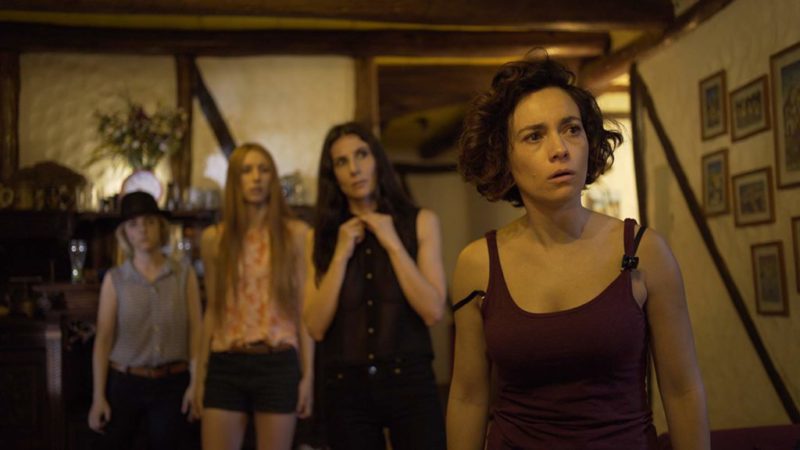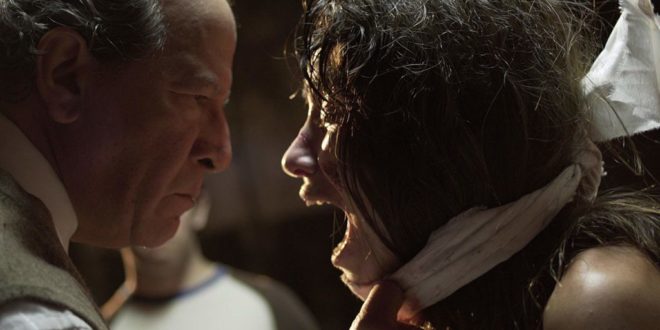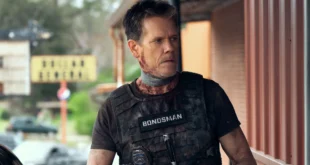Extreme horror is home to the some of the most violent, bloodiest, and controversial films out there. They tend to pack an unprecedented punch to the viewers gut, burning into the memory, leaving a lasting impression. Writer/Director Lucio A. Rojas’ (Perfidy 2014) latest film, Trauma, is no exception to this rule, but he also includes something that will increase the level of fear – real-life horror. The director reaches into a dark place in Chile’s history, using it as a terrifying template for his feature. Within the first five minutes of this movie, I needed to pause it, smoke a cigarette, and prepare myself for what was already panning out to be one of my most intense watches of this year.
Chile, 1978. Trauma opens with screams, pleas of mercy, and an atmosphere of oppressive human evil. A bloody, beaten, bound woman sits in complete terror awaiting her next “political punishment.” The tension is felt immediately as her captor comes into focus, feeding off of her fear and branding her as a traitor. Suddenly, a young man is dragged into the torture chamber and brought before the poor woman. When she sees it is her son, Juanito, she attempts to console him and beg for the soldiers to let him go. Instead, he is injected with something, forcibly aroused, and made to rape his own mother. The Commander, who we then learn is the father of this boy, whispers in her ear, “Now I’m going to **** your daughter…” He then proceeds to have the woman shot in the head as Juanito is still pumping away inside his mother’s dead body with her brain matter sprayed upon him. The young man’s face morphs from terrified to traumatized, and that, folks, is how this story fucking begins.
Fast forward to Chile 2011, a more progressive era with a much larger sense of political and personal freedom. Now insert a lesbian sex scene to ease your eyeballs from what they just experienced. A stark contrast in mood and tone is initiated, and we are introduced to four young women who come together to take a break in the quiet, peaceful Chilean countryside. We all know this is not what the girls had in store, and I must warn that this film itself may give you more than what you bargained for, because this is kind of the calm before the storm. After the opening that Trauma presented, I continued watching with a heavy anxiety hanging over me. Like a kid walking through a haunted house, trying to anticipate the next scare and failing to do so, Rojas and company created a challenging spectacle.
To ensure that Andrea (Catalina Martin: Un Diablo Con Angel 2017) has the right directions to the cottage, she and her sister, Cami (Macarena Carrere: The Amazing Metamorphosis of Juan Perez 2016), girlfriend, Julia (Ximena del Solar: Perfidy 2014), and pal, Magdalena (Dominga Bofill: Casandra 2019), stop at a dive bar and ask for help. This poor decision provides the opportunity for the group to be targeted, narrowly escaping a confrontation in the bar with a questionable patron (played by fellow extreme horror filmmaker Felipe Eluti). The ladies end up making friends with a little girl named Yoya (Florencia Heredia: Lo Que Callamos Las Mujeres 2013) and find their destination courtesy of a mysterious man in the bar. They make their way to the isolated homestead, but not before being warned by two local cops to stay clear of that particular watering hole.

The group of girls shake off their encounter at the bar and begin to settle in at the cottage, drinking and discussing their lives, making way for a complicated group dynamic to emerge. Just when I felt things between them all were about to boil over, they are surprised to see the mysterious man from the bar watching them through the window. This marks the descent into a living Hell for the four ladies because this man turns out to be Juan (Daniel Antivilo: To Kill A Man 2014), the boy from the beginning. Now an adult with enough emotional baggage to sustain countless Lifetime Movies, he makes his way into the home, along with his equally as deranged son, Mario (Felipe Rios: Videoclub 2013), by his side.
I’m terrified, because as a viewer, I have already seen scenes involving the depravity of these two men, so I’m on edge to see where this will all go. And Trauma goes all out with the violence on every fucking level. I sat shocked as an aggressive, frenzied attack unfolded in front of me, making me uncomfortable enough to look away. Each actress successfully demonstrated terror, fear of losing their life, and ultimately trauma inflicted by the father and son. The men delivered haunting performances as the dysfunctional, murderous duo.
After a horrendous and sadistic torture at the hands of Juan and Mario, the women are left bound, brutalized and in a sense of shock. Yet Magdalena still finds a way out of the restraints. This scene was incredibly tense as we watch her shuffle in a mental state bordering on madness throughout the house, attempting to find a way to escape and find help. It ends badly for her, though, and the rest are left in disbelief at what has transpired as the men simply walk away from the cottage knowing the locals will do nothing about their crimes. But Pedro (Eduardo Paxeco: Optical Illusions 2009), one of the police officers who comes across the wake of violence left by the pair, refuses to let them go unpunished, agreeing to help the girls. Instead of remaining just victims, the women resort to violent vindication and set off with Pedro to end Juan and Mario’s reign of terror.
We, as an audience, get a steady succession of unrelenting scenes. I felt almost ill following along with this impressive entry into extreme horror. It is graphic, bold, and incredibly violent. There are beatings, stabbings, shootings, throat slashes, acid burns, rape, sodomy, incest, and poisonous gas deaths. There are scenes depicting gunshot blasts to the head and a crowbar ripping a poor soul’s jaw apart. The gore and the team behind all of these bloody demises need to be commended because they are fucking fantastic. Trauma was nominated for Best Midnight Feature at this year’s Nightmares Film Festival and Sebastian Ballek took home Best Cinematography from the Horrorant Film Festival for his talented work on this feature. It’s a well made piece of foreign filmmaking that shares actual atrocities that took place in Chile’s history. Rojas took these disturbing facts and created a uniquely dark spin-off of what could have been, one that will certainly ruffle some feathers and obtain cult status with others.
 PopHorror Let's Get Scared
PopHorror Let's Get Scared




